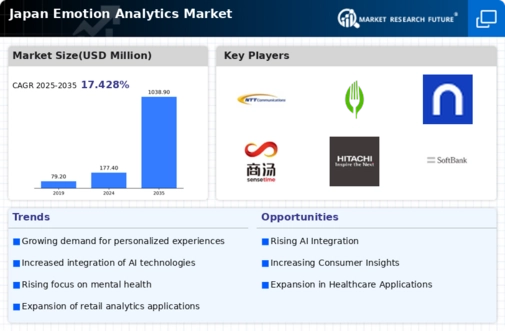Expansion of E-commerce Platforms
The rapid expansion of e-commerce platforms in Japan is significantly influencing the emotion analytics market. As online shopping continues to gain traction, businesses are increasingly focused on understanding consumer emotions to enhance the online shopping experience. Emotion analytics tools are being employed to analyze customer feedback, reviews, and interactions on e-commerce sites, enabling companies to identify emotional triggers that influence purchasing decisions. Recent data suggests that the e-commerce market in Japan is expected to surpass $200 billion by 2025, creating a substantial opportunity for emotion analytics solutions to thrive. This growth indicates that businesses are prioritizing emotional insights to drive sales and improve customer satisfaction in the competitive e-commerce landscape.
Growing Focus on Mental Health Awareness
The rising awareness of mental health issues in Japan is influencing the emotion analytics market positively. As society becomes more attuned to the importance of mental well-being, businesses are seeking ways to understand and address consumer emotions effectively. This shift is evident in various sectors, including healthcare, where emotion analytics tools are being utilized to gauge patient sentiments and improve service delivery. Reports indicate that the mental health market in Japan is projected to reach $3 billion by 2026, creating opportunities for emotion analytics solutions to play a pivotal role in enhancing mental health services. Consequently, the emotion analytics market is likely to benefit from this growing focus on mental health, as organizations strive to create supportive environments for their customers.
Rising Demand for Personalized Marketing
The increasing emphasis on personalized marketing strategies in Japan is driving the growth of the emotion analytics market. Businesses are recognizing the importance of understanding consumer emotions to tailor their marketing efforts effectively. According to recent studies, approximately 70% of Japanese consumers prefer personalized experiences, which has prompted companies to invest in emotion analytics tools. These tools enable organizations to analyze customer sentiments and preferences, thereby enhancing engagement and conversion rates. As a result, the emotion analytics market is witnessing a surge in demand, with projections indicating a potential growth rate of 25% annually in the coming years. This trend highlights the necessity for businesses to adopt advanced analytics solutions to remain competitive in a rapidly evolving market landscape.
Advancements in Technology Infrastructure
Japan's robust technology infrastructure is a significant driver for the emotion analytics market. The country boasts one of the highest internet penetration rates globally, with over 90% of the population having access to high-speed internet. This widespread connectivity facilitates the collection and analysis of emotional data from various digital platforms. Furthermore, advancements in artificial intelligence and machine learning technologies are enhancing the capabilities of emotion analytics tools, allowing for more accurate sentiment analysis. As organizations increasingly leverage these technologies, the emotion analytics market is expected to expand, with estimates suggesting a market value exceeding $500 million by 2027. This growth underscores the critical role of technological advancements in shaping the future of the emotion analytics market.
Increased Regulatory Compliance Requirements
The evolving regulatory landscape in Japan is driving the need for compliance in data usage, which in turn impacts the emotion analytics market. With stricter regulations surrounding data privacy and protection, businesses are compelled to adopt ethical data practices. This has led to a heightened demand for emotion analytics solutions that not only provide insights into consumer emotions but also ensure compliance with legal standards. Companies are increasingly investing in technologies that facilitate transparent data collection and analysis, thereby fostering trust among consumers. As a result, the emotion analytics market is expected to grow, with a projected increase of 15% in demand for compliant analytics solutions over the next few years. This trend highlights the intersection of regulatory compliance and the need for advanced analytics in understanding consumer emotions.
















